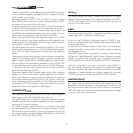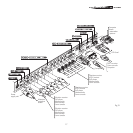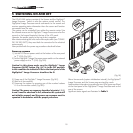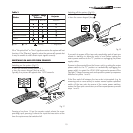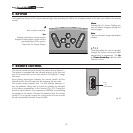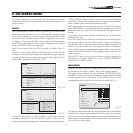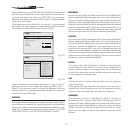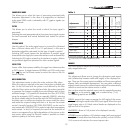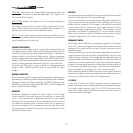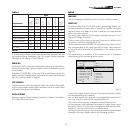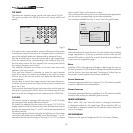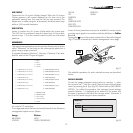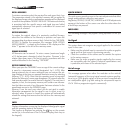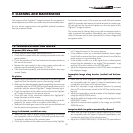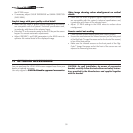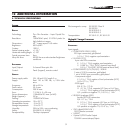
24
PANORAMIC:
stretches the 4:3 image, slightly cropping the upper and
lower parts. Panoramic is ideal for displaying a 4:3 image on the
16:9 screen of the Display.
PIXEL TO PIXEL:
displays the image as it is input without adapting it
to the screen.
The image is projected in the centre of the screen and if its hori-
zontal and/or vertical dimensions are smaller than the display, it is
bounded by vertical and/or horizontal black bands.
USER 1, 2, 3:
when none of the preset formulas are suitable, the User
formulas are available, with the facility for continuous horizontal and
vertical adjustment of picture size.
COLOUR TEMPERATURE
Changes the colour balance of the image and is referred to the co-
lour temperature of white. Colours can be adjusted towards the red
end of the spectrum (low colour temperature values - expressed in
degrees Kelvin) or the blue end (high values). Colour temperature
can be selected with three preset values:
HIGH, MEDIUM
and LOW. In
addition, a
USER
setting is provided in which the user can set the white
point by making separate adjustments for Red, Green and Blue.
Generally, the
HIGH
value is more suitable for displaying graphic
images, while
MEDIUM
and
LOW
values are preferable for video
images.
GAMMA CORRECTION
Determines the system’s response to the grey scale, emphasising or
attenuating the different grades of brightness (blacks, dark, medium,
light grey, whites) in the projected image. The
GRAPHIC
setting is more
suitable for computer images, while the
VIDEO
and
FILM
settings are
more suitable for video images.
OVERSCAN
Eliminates irregularities around the outer borders of the image.
Certain relatively inaccurate sources can produce an image with
more or less pronounced irregularities around the outer edges;
thanks to the overscan function these imperfections can be moved
to outside the displayed area. Overscan values can be between 0
(no overscanning) and 32 (maximum overscanning). The result-
ing image always maintains the selected aspect irrespective of the
selected overscan value.
POSITION
Use this adjustment to position the image vertically and horizontally.
Determines the aspect of the displayed image.
These parameters do not normally require adjustment because the
system examines the input signal and automatically sets the most
suitable values. However, if the image is not perfectly centralised
it may prove useful to repeat the input signal analysis and the
consequent image positioning procedure. This automatic control
procedure is activated by pressing key “A” on the remote control.
When this procedure is called it is helpful to have a white or light
coloured background on the screen in the current picture.
FREQUENCY/PHASE
These adjustments, available for progressive signals and for signals
from a PC, ensure correspondence between the number of pixels
making up the signal and the number of pixels that make up the
projected image.
These parameters do not normally require adjustment because the
system examines the input signal and automatically sets the most
suitable values. However, if the image appears disturbed (loss of
resolution within equidistant vertical bands or instability and lack of
sharpness on narrow vertical lines) it may help to prompt the system
to repeat the input signal analysis and consequent determination of
the frequency and phase parameters. This automatic control proce
-
dure is activated by pressing key “A” on the remote control.
If the automatic procedure fails to have the required effect, enter the
frequency and phase values manually and move sufficiently near to
the screen to observe the effects of the adjustments.
Y/C DELAY
In the case of Video and S-Video signals, it may be necessary to
correct horizontal colour misalignment within the projected image.
For a given video standard (e.g. PAL or NTSC) the stored value
does not normally require further fine-tuning, unless the source or
connection cable is changed.



